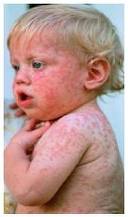Congenital rubella
Congenital rubella is a group of physical problems that occur in an infant when its mother is infected with the virus that causes German measles.
Risk factors for congenital rubella include:
Not getting the recommended rubella immunization Contact with a person who has rubella (also called the 3-day measles or German measles)
Symptoms in the infant may include:
Cloudy corneas or white appearance to pupil Deafness Developmental delay Excessive sleepiness Irritability Low birth weightLow birth weight Mental retardation Seizures Small head size Skin rash at birth
Complications may involve many parts of the body.
Eyes:
Cataracts Glaucoma Retinitis Heart:
Patent ductus arteriosusPatent ductus arteriosus
Pulmonary artery stenosis Other heart defects
Central nervous system:
Mental retardation Motor retardation Small head from failed brain development Encephalitis Meningitis
Other:
Deafness Low blood platelet count Enlarged liver and spleen Abnormal muscle tone Bone disease
Treatment: There is no specific treatment for congenital rubella. Care involves appropriate treatment of affected systems.Vaccination prior to pregnancy can prevent congenital rubella.

